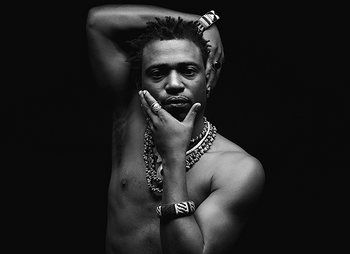Afropean+: Fredy Massamba builds bridges

Nzimbu is a brand-new acoustic project, which is being brought to Afropean+ by Ray Lema, Fredy Massamba, and Ballou Canta. Three generations, three singers, three timbres – with roots on both sides of the Congo River – and a rich musical tradition that they have seasoned with modern influences such as soul, jazz, and hip hop. “Kikongo swings like no other language,” Massamba told us.
The singer, pianist, and guitarist Ray Lema, born in 1946 in the province of Bas-Congo (Democratic Republic of the Congo), emerged as one of the most important voices of his generation. Fredy Massamba, some thirty years younger, was born in Pointe-Noire, on the other side of the Congo River. He is a child of his time and mixes his roots with soul, hip hop, and R&B, while also drawing on African polyphony and song in the Kikongo language. Massamba is a true Afropean, a bridge builder, with one foot in European culture and the other deeply rooted in African culture.
“We both live in Europe, but it wasn’t until 2011 that we really got to know each other, in Kinshasa,” recalls Massamba. “I was there for a gig at a hip-hop festival, while Ray was making his big comeback in his homeland. When our paths crossed, we became aware that we really had the same roots, even though we were born in different countries. He is from Bas-Congo and I’m from Congo-Brazzaville; we speak the same language, Kikongo.”
Back in Europe, Massamba went to visit Lema in Grenoble, where a powerful human and musical bond developed between them. “We are really on the same wavelength. Our connections with Africa and with the world, our way of looking at things: the common good, anti-racism, tolerance... We had to do something with that, on an album.”
The original idea was an encounter between two generations, but it soon became clear that the tracks wouldn’t take on the colour they were looking for with just the two of them involved. “We needed a third voice. Ray suggested Ballou Canta, one of the great singers of his generation in rumba and soukous. He has a very high-pitched voice, I’m in-between, and Ray goes really deep, in the bass notes. That way, we can achieve the characteristic Congolese three-part harmonies.”
It was never about reuniting the two Congos. The division, according to Massamba, is an artificial one. “It’s one and the same people, a single language with a river that isn’t there to divide peoples, but actually to bring them together, as it did in the past. We focus particularly on the language, Kikongo, a language that really swings. At a time when many African languages are threatened with extinction, we think it’s important to record them for future generations.”
So that’s what they have done on their debut album, which is also called Nzimbu. “Nzimbu” means wealth, song, and also money. Massamba compares it to the cowrie shells that used to be used as a unit of currency. “Those shells were used in trade; people with lots of shells enjoyed great respect, but there was nothing like the abuse of power today. We want to hark back to the wealth of our ancestors. For them, money wasn’t used to set people against each other; on the contrary, it was used to bring people together.”
Musically, it is very much an acoustic project. Three voices, a piano, and a guitar, and that’s it. “Without any percussion, without any drums. It is the voices that provide the groove. We each contributed a few numbers. Mine had to be translated from hip hop-soul to guitar and voice. That was quite a challenge.”
“Les oubliés du Kivu”, about the war in eastern Congo, is the only track in French. “Despite the six million dead and the use of rape as a weapon of war, there hasn’t been a peep out of anybody about that conflict. The biggest UN operation ever, MONUC, is in operation there and still the slaughter and the rapes continue. How many dead does it take to declare a genocide?”, Massamba asks rhetorically. “We can’t stay silent about it, as that would make us accessories.” But the album also tackles subjects that are not so grim, as on “Sambu”, which is a prayer, and “Nkento”, an ode to women.
Nzimbu, 17/1, 22.00
African diaspora in the European cultural landscape
In Afropean+, Bozar turns the spotlight on the cultural significance of African immigration in Europe via exhibitions, documentaries, talks, discussions, activities, and, of course, lots of music. The festival is taking place in the context of the European Year for Development.
Two of the exhibitions have already been on view since December. Continuum of Repair: The Light of Jacob’s Ladder is an installation in which the French-Algerian artist Kader Attia explores the meaning of anthropology, politics, and science. “Timbuktu Renaissance” offers an opportunity to discover manuscripts of inestimable cultural value from Timbuktu (in northern Mali), with images and sounds from today’s Timbuktu to underline the timelessness of that heritage.
On 17 January, you can see a number of films and documentaries, including animated films for children between the ages of eight and twelve. There will also be talks and the launching of a comic strip, Paul Panda Farnana, une vie oubliée/een vergeten leven, about one of the first Congolese to study in Belgium, who was a passionate champion of his people’s rights. All afternoon, there will be discussions about, among other subjects, culture and enterprise in the Afropean context and the role of Afropean women. Along the way, you can drop in on a creative market, take part in workshops for children, and sample some African cuisine.
Afropean+ • 17/1, 10 > 2.00, Bozar, rue Ravensteinstraat 23, Brussel/Bruxelles, 02-507.82.00, www.bozar.be
Read more about: Muziek, Events & Festivals
Fijn dat je wil reageren. Wie reageert, gaat akkoord met onze huisregels. Hoe reageren via Disqus? Een woordje uitleg.